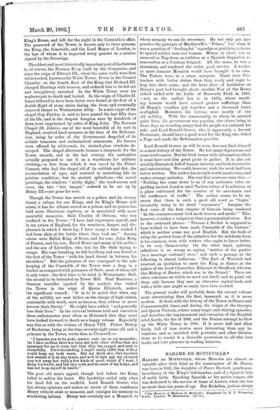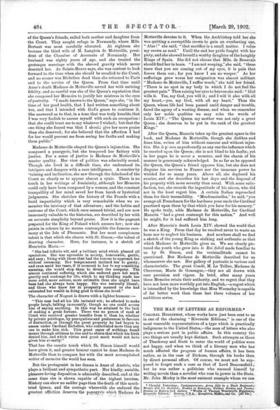MADAME DE MOTTEV1LLE.•
MADAME DE MOrrEVILLE, whose Memoirs are almost as valuable after their kind as the masterpiece of St. Simon, was born in 1621, the daughter of Pierre Bertaut, gentleman- in-ordinary of the King's bedchamber, and of a Spanish lady . of noble birth. Speaking Spanish as her native tongue, she was dedicated to the service of Anne of Austria when she was no more than ten years of age. But Richelieu, jealous always • The Memoirs of Madame de Motterille. Translated by H. P. Wormeley. S vol.. Ifoodon : W. Heinemann. [a 39.] Of the Queen's friends, e-xiled both mother and daughter froM the Court. They sought refuge in Normandy, where Elle. Bertaut was most carefully educated. At eighteen she became the third wife of M. Langlois de Motteville, presi- dent of the Chamber of- Accounts of Normandy. Her Inisband was eighty years of age, and she treated the grotesque marriage with the shrewd gravity which never deserted her. As Sainte-Beuve says, she was content to look forward to the time when she shOuld be recalled to the Court, and no sooner was Richelieu dead than she returned to Paris and to the service of the Queen. From that time until Anne's death Madame de Motteville served her with untiring fidelity, and so careful was she of the Queen's reputation, that she composed her Memoirs to justify her mistress in the eyes of posterity. "I made known to the Queen," says she, "in the time of her good health, that I had written something about her, and that I intended with God's grace to continue it. She answered as to that, in a tone that was truly humble, that Pwas very foolish to amuse myself with such an occupation; that she could trust me to say whatever I wished; but that the one thing she-feared was that I should give her more praise than she deserved; for she believed that the affection I had for her would prevent me from seeing her faults and making them public."
Madame de Motteville obeyed the Queen's injunction. She composed a panegyric, but she tempered her flattery with justice. For a sense of justice is Madame de Motteville's master quality. Her view of politics was admirably sound. Though she lived in a difficult time, she understood its intrigues and dangers with a rare intelligence. A courtier by training and inclination, she saw through the falsehood of the Court so clearly as to appear almost a cynic. There is no touch in her writings of femininity, although her Memoirs could only have been composed by a woman, and the constant tranquillity of her mind saved her from harsh or hysterical judgments. She sketches the history of the Fronde with a lucid impartiality which is very remarkable when we re- member the intricacy of that adventure ; and'the habits and customs of the Court, which once seemed trivial, and are now immensely valuable to the historian, are described by her with an accurate simplicity beyond praise. Now it is the pageant prepared. for the King of Poland which amuses her; now she paints, in colours by no means contemptible the famous cere- mony at the Isle of Pheasants. But her most conspicuous talent is that which she shares with St. Simon,—the talent of drawing character. Here, for instance, is a sketch of Henrietta Maria :- " She had infinite wit, and a brilliant mind which pleased all spectators. She was agreeable in society, honourable, gentle, and easy; living with those that had the honour to approach her without ceremony. Her temperament inclined her to gaiety; and even amid her tears, if it occurred to her to say something amusing, she would stop them to divert the company. The almost continual suffering which she endured gave her much gravity and contempt for life, which to my thinking made her more solid, more serious, more estimable than she might have been had she always been happy. She was naturally liberal; and those who knew her in prosperity assured us she had exhausted her wealth in doing good to those she loved."
The character of Nogent is drawn with a lighter humour
"This man had all his life imitated wit; he affected to make people laugh, talking incessantly, though no one could accuse him of saying anything. In this way he attained to the luck of making a great fortune. There was no person of rank at Court who received greater benefits from it than he, whether by private privileges, by prerogatives and preferences to favours of distinction, or through the great propertY he had begun to amass under Cardinal Richelieu, who contributed more than any one to make him rich. This groat sayer of nothings found- means through silliness to rise and to obtain that which his birth denied fifth, and which virtue and great merit would not have given him sn easily." .
That has the caustic tench which St. Simon himself would have given it, and greater hon-Our cannot be done. Madame de. Motteville than to compare her with the most accomplished
writer of memoirs the world has seen. - •
But the protagonist in her drama is Anne of Austria, who plays a brilliant and sympathetic part. • Her kindly, amiable, pleasure-loving disposition is admirably described, and at the same time she is shown capable: of. the highest heroism. History can show no sadder page than the death of this much- tried Queen, and the courage wherewith she endured the greatest affliction deserves the papegyric Which Iga,clame de Motteville devotes to-it. When the Archbishop told..her she
Was quitting a corruptible crown to gain an everlasting one „
"Alas !” she said " that sacrifice is a small matter. I value my crown as Mud." Until the end her pride -fought. with her piety,- and ihe'showed herself a Worthy. daughter of the hanghty Kings of Spain. She did not choose that Mlle. de Beauvais should find her in tears. "I am not weeping,". she said, " theae tears that you see coming out of my eyes,, it is pain that forces them out ; for you know I am no weeper." As her sufferings grew worse her resignation was almost militant "Madame de Motteville, I suffer much," she' told' her 'friend. "There -is no 'spot in my body in which I do not feel the greatest( pain." Then raising her eyes to heaven she' said: .0:411 wills it. Yes, my God, you will it; and I willlt also with all my heart, yes, my God, with all my heart." Thus the Queen,-whose life bad been passed amid danger and trouble, faced the agony of a wasting disease, and when we remember only her noble qualities we may echo the words : of Louis XIV.: " The Queen my mother was not only a great Queen ; she deserves to be rit in the rank of the greatest Kings."
After the Queen, Mazarin takes up the greatest space in the book, and Maclaine de Motteville, though she dislikes and fears him, writes of him without rancour and without injus- tice. She dt p' Ores as profoundly as any one the influence which he exerted upon the Queen; she is not blind to his faults; yet in her pages he is never a monster, 'and the charm of his manner is generously acknowledged. In so Tar as he opposed the Queen, the Queen's friend Opposes him, but she does not disguise his services to France nor the immense pOwer he wielded for so many years. Above all, she deplored his avarice, and she describes his last days and the disposal of his property with more severity than usual. With some satis- faction, too, she records the ingratitude of his nieces, who did not in the least regret him. A certain Italian reproached them for their insensibility. "Mesdemoiselles," he said, "you avenge all Frenchmen for the hardness your uncle the Cardinal practised upon them by that which you have for his memory." He spoke truly, adds Madame de Motteville, for Cardinal Mazarin " had a great contempt for this nation." And well he might, for it had suffered him long.
After Mazarin's death Louis xrv. showed the world that he was a King. From that day he resolved never to waste an hour nor to neglect his business. And nowhere shall we find a sketch of the young King as striking and authentic as that which Madame de Motteville gives us. We see clearly pic- tured the youth who grew into is Roi Soleil made familiar to us by St. Simon, and the verisimilitude cannot be questioned. But Madame de Motteville described for us whomsoever she saw. Her gallery of portraits.is various and characteristic. The great Conde, M. Le Tellier, Madame de Chevreuse, Marie de Gonzague,—they are all drawn with rare precision and vigour. In brief, after many years these Memoirs retain their authority, and we regret that they have not been more worthily put into English,—a regret which is intensified by the knowledge that Miss Wormeley is capable of far better work than these last three volumes of her ambitious series.







































 Previous page
Previous page